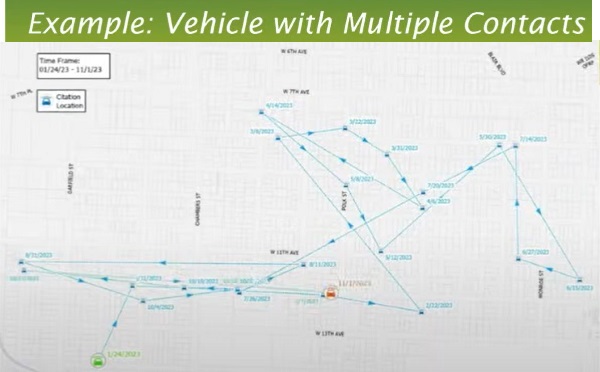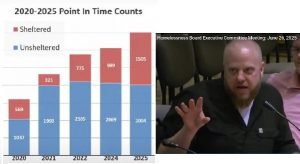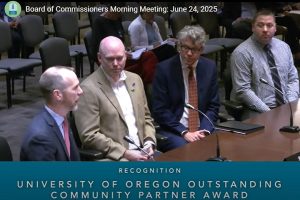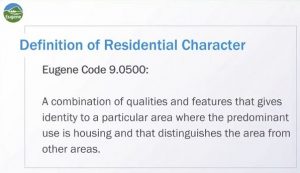Council sets public hearing on new parking rules targeting the homeless
10 min read
More people are living in their cars and RVs on the streets, in places not designed for human habitation. Seeing a spike in access, safety, and sanitation issues, the city beefed up its parking rules in 2021. With complaints still coming in, the city council asked staff: What else can be done?
[00:00:19] Jeff Petry (Public Space incident commander): I am Jeff Petry, the acting Public Space team incident commander. In 2020, we experienced a global pandemic with local stay-in-place orders that made public space camping pervasive, ongoing, and highly visible. We also had hundreds of vehicles occupying curbs beyond code allowances that disrupted business and resident uses of the curb.
[00:00:38] We’re still receiving an elevated level of service requests from the community around camping and stored vehicles. We have addressed the vehicle complaints that peaked in 2021 through a combination of signage and regulation changes, as well as the creation of a neighborhood services officer team.
[00:00:56] In 2021, council requested staff develop and implement a parking plan to create curbside vehicle turnover in the West Eugene industrial commercial areas. Staff completed that project in 2021 and continue to work with business and neighborhoods to manage the curb. The volume problem did decrease dramatically.
[00:01:12] To date, we’ve installed approximately 1,000 parking signs. Additionally, the city’s latest vehicle towing contract added more companies, increasing the capacity for needed tows. Previously, we would often have vehicles eligible for tow because of violations or safety but would not always be able to get a truck because of limited capacity. That has not been the case since August.
[00:01:34] And finally, we’ve created dedicated cleanup teams in the right-of-way to work to remove personal items and debris from the right-of-ways.
[00:01:43] A small number of vehicles account for multiple warnings and parking fines. Over the last 10 months, parking and neighborhood service officers have issued 5,770 warnings and parking fines, citations to vehicles for storage on the street or and/or expired license plates.
[00:02:05] We regularly receive complaints about vehicle parking in residential areas and moving around the neighborhood. For one specific vehicle, we received 69 service requests over the last 10 months, mostly for storage on the street violations. Within this 69 complaints were also duplicate complaints because neighbors and other community members will report the same infraction multiple times.
[00:02:28] Officers responded to the service request and issued 24 warnings for potential violation of storage on the street code and two parking fines. The vehicle has not violated the 72-hour storage on the street rule and has not received a storage on the street parking fine. It moves when a warning is issued.
[00:02:48] That is, staff receive the service request, respond to the request, issue a warning of potential violation, and when an officer returns after 72 hours, the vehicle is not present because it moved from this location. We then mark that service request as closed.
[00:03:05] While this vehicle generates community service requests, it complies with the city’s ‘Storage on the Street’ code for parking in a public right-of-way.
[00:03:13] Another common community complaint regarding vehicles with expired or no license plates. In the last 10 months, parking has issued close to 2,500 citations or parking fines of $90 each to vehicles with expired or no license plates.
[00:03:31] Of those numbers, about 450 had no plate visible. Vehicles operating on our streets without legal registration is a public safety problem that’s shown to be a major point of concern for our community.
[00:03:44] What else can be done? There are four potential code changes that could address community wide parking concerns:
[00:03:51] The first item is parking time limits.
[00:03:53] John Q: After two hours, you would have to move, and not return to that block that day.
[00:03:57] Jeff Petry: The second relates to vehicles in sleeping areas. This potential code change would enable the officer to impound the vehicle if the third fine violation happened within a 90-day period.
[00:04:09] The third area of potential code amendment would prohibit a vehicle from blocking a mailbox and authorize a citation and or impoundment, similar to blocking a driveway. This is a frequent service request across the community and something that, for people that receive this, they usually receive a note from their postal carrier asking them to move the vehicle that may or may not be their vehicle.
[00:04:31] The fourth potential code change is around vehicle discharge. The amendment would enable the neighborhood and parking officers to respond and then remediate the situation more quickly and not utilize limited police resources.
[00:04:45] John Q: Vehicle discharge refers to graywater or sewage.
[00:04:50] Councilor Randy Groves: I do recognize it’s not every vehicle out there that’s creating these issues. I know in my own ward, I’ve tracked some that literally have three points they go to, and they just move from one to the next to the next, but it creates problems where they are ending up, but others are figuring out how to make this work and remain within, I guess, acceptable parameters. The $25 fee, the fine, it seems pretty low. I mean, in the level of inconvenience this is causing—there’s frequently garbage left behind. I mean, it’s just a problem for people in the residence, for our workers that are trying to stay employed, and employers are trying to remain in business.
[00:05:36] Councilor Matt Keating: I hear from South Eugene neighbors regularly about the back of Tugman Park and vehicles or operators of said vehicles just moving along with one of those 5,000 plus warnings. They’ll move along a few blocks and they’ll be right back. And they’re parked in proximity to a park that is used by entire neighborhood—children, folks walking their pets, and in close proximity to a storm drain. Could we, in addition to prohibiting a vehicle from blocking a mailbox, include a storm drain?
[00:06:17] Jeff Petry: The drains is not in our code, and I’m not sure where those where they all fall on the block face. They tend to be at the ends, which are also usually yellow-zoned and already accounted for in our code.
[00:06:30] Blocking a driveway is a violation and it’s three feet on either side of the driveway lane. And blocking a fire hydrant is also in our code. And the bike lanes, we do have code for citing and removing a vehicle from a bike lane.
[00:06:44] Councilor Emily Semple: Are the citations working at all? $25 isn’t that much, but I know a lot of people just ignore the citations no matter what they are. So I think that would be valuable information, if they’re not working, what would work? And would it make any difference if it was $250 or $25? ‘Cause if can’t pay $25, you’re not going to pay $250.
[00:07:06] The yellow paint: We don’t have much yellow paint. It’s all faded away, chipped away. Do we have any kind of budget or ability to replace that? Because people are parking by fire hydrants. So can we have more yellow paint? What would happen if somebody went out there with their wire brush and spray paint and put it in themselves? Would, you know, anybody notice? Would there be a punishment?
[00:07:34] City Attorney Kathryn Brotherton: There are code provisions that prohibit people from painting and doing things to our right-of-way. There would be a different, separate offense if someone was to do that .
[00:07:47] Councilor Alan Zelenka: I’m assuming that the people that are getting these fines are homeless and probably jobless and are indigent and this is kind of like the camping violations where they just stack up. One time on the police commission, we heard a story about a person who had over 40 camping violations. It made absolutely no difference to give them another citation because it didn’t mean anything and it didn’t work. I’m not sure we’re actually doing anything. Same question about impounding cars, I mean, they’re homeless or jobless. What happens if they can’t pay the impoundment fee? What happens to the vehicle?
[00:08:24] Jeff Petry: So our impoundment process, the owner of the vehicle has what we call a validity hearing within five days at Municipal Court. And we encourage if your car gets impounded, and you feel like it was impounded incorrectly, then have that validity hearing. And court will work with the owner of that vehicle for payments or reduced fine schedules.
[00:08:43] If that time passes and that lien is perfected, and they show ownership of the vehicle, they can pay the fees, which is not necessarily the parking fines, the fees for impoundment, and remove the vehicle from impoundment.
[00:08:57] Or if they don’t retrieve the vehicle, there’s only perfecting a lien process, 15 days, 30 days, where it can be sold or recycled.
[00:09:06] Councilor Alan Zelenka: I understand the problem. I understand what’s going on, but I’m wondering if these things will work and if it makes any difference. I mean, if it’s like the camping guy who got over 40 citations, that didn’t work.
[00:09:18] And if it’s poor, jobless, homeless people, they can’t afford to pay these things, or they get their car impounded then they’re homeless and this makes it worse. I’m just not really sure that fines and impoundment are the right tools. But I don’t have any really good ideas about what to do alternatively. I’d like to hear what people think about that at the public hearing.
[00:09:38] John Q: Jeff said the threat of impoundment is effective.
[00:09:41] Jeff Petry: What we find in the public right-of-way is that because of the impoundment outcome, potential outcome, we do find people comply with the code. If we did not have that tool, we would probably see less compliance in the right-of-way.
[00:09:57] Councilor Randy Groves: I want to go back to the Amazon canal and the private property that’s intermixed within public parks lands. First of all, I think Parks and Open Space has done a really good job of trying to address that. But I also have seen how the private property intermingled into the public property has really created a challenge.
[00:10:20] I walk that path fairly regularly and I did a comprehensive walk here a couple of weeks, a couple of Fridays ago. And the human waste and the pollution that gets into the Amazon, which finds its way into Fern Ridge and then finds its way back into the Willamette River, private property or public property, it has the same effect. And it seems like part of this is to try and protect a waterway.
[00:10:43] And so, I would really like to hear some thoughts of how we can go about that. How can we help protect this asset and protect our community? Because some of these encampments, also, the people in them are threatening people using the path and it’s not a safe area. So, I’ve got a number of concerns there, but I mean, it all starts with not having camping along our waterway.
[00:11:07] Councilor Matt Keating: How doable is it for a uniform three-hour or five-hour limit for vehicle parking around our community parks citywide, so we don’t have to piecemeal? We can just have one clear direction. It was impressed upon us that there are community-wide parking issues. There are far beyond community-wide parking issues: There are community-wide public safety issues, community-wide public health issues, community-wide environmental issues.
[00:11:40] Jeff Petry: Councilor, the standard sign is two-hour parking Monday through Sunday, 7 a.m. to 11 p.m. And Tugman Park is an area that’s on our list to go through the administrative process and add more of those regulations. We are slowly working through our signage, our administrative orders and our regulations across the city.
[00:12:00] Councilor Emily Semple: We’re concentrating on parking, but I will bring up that the tent camping is still rampant everywhere. And it really comes down to where can you go. You know, except for our Garfield place, there really isn’t any place to go. And an RV is a shelter. It’s better than a tent or nothing. So it’s hard to say, ‘Okay, we’re going to take it away and put it in this impound, which you probably can’t afford to get it out. And now we have to pay to recycle it.’
[00:12:30] I don’t have the answer, but I hear from people on both sides who are very upset about RVs on their street, and it blocks your view, even if they don’t have garbage. But I also hear from people who are desperate to stay in that shelter and they have nowhere to go, so they figure out the 72-hour thing and hey, it worked. He didn’t get tickets for it.
[00:12:54] So we need more places to go, and we need more people to enforce the ordinances we do have, because we don’t have the people power to do that, and that makes them ineffective in at least a lot of situations, and then the residents get more upset.
[00:13:12] So, what a dilemma. I want to take care of the residents and their peace of mind and happiness, and I want to keep people sheltered in whatever kind of shelter they can have. I know there’s not a solution right now, but those are my concerns.
[00:13:27] John Q: The council votes unanimously for a public hearing on four new proposals to tighten parking regulations, as the city fine-tunes policies that target the homeless.
[00:13:37] Earlier this month Saint Vinnie’s Terry McDonald told OPB he’s seeing more seniors among the homeless. And where women used to represent just 10-13%, now half of the homeless are women, many over the age of 50.
Richard Self from KEPW Newsday contributed to this story.





